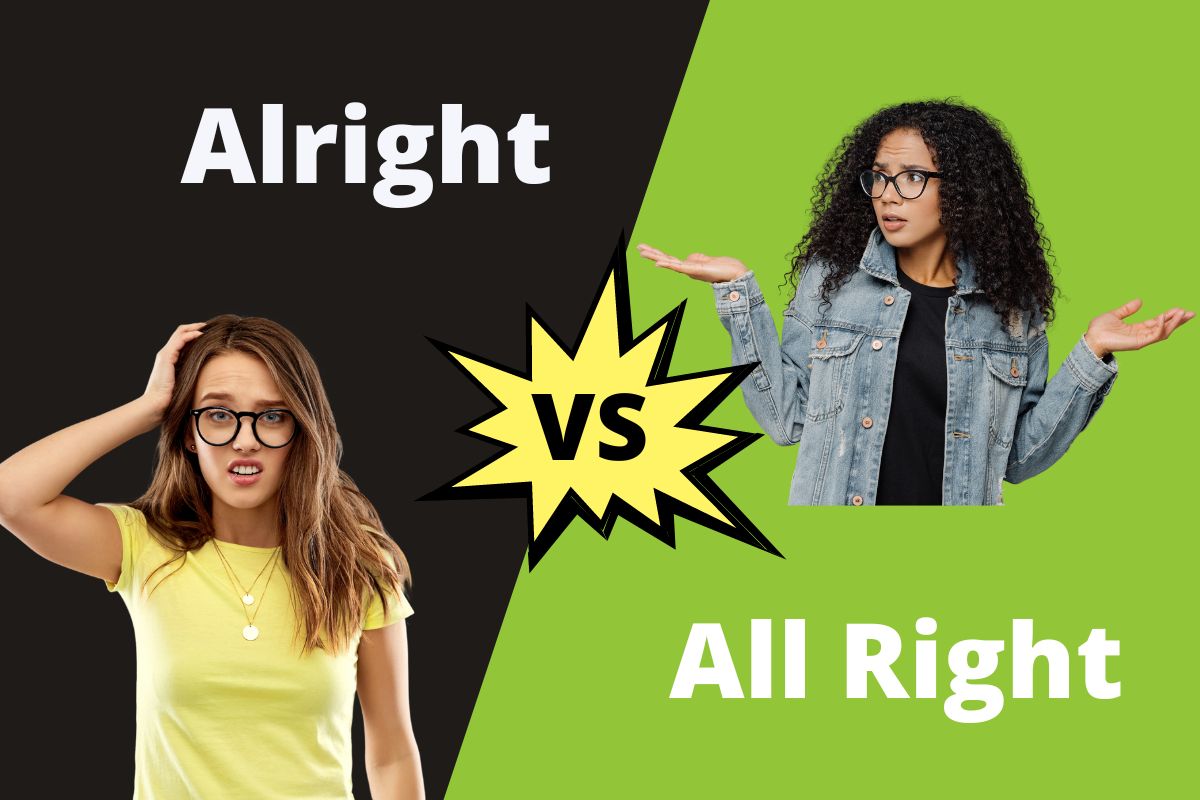While these terms can be used to mean the same thing, alright is usually used as a form of acknowledgement or satisfactory, while all right is used to mean satisfactory only.
The standard English language is full of surprises. If you study this language correctly, there are a lot of places where one word would look and mean the same as the other. Two American English terms are alright and all right.
Table of Contents
Alright vs All Right
| Alright | vs | All right |
| To affirm something | Meaning | To ensure that everything is correct |
| Informal situations | Use | Formal situations |
| Newer and modern | History and changes | Older and historically evolved |
Difference Between All Right vs Alright
Meaning
Depending on the context and writing style, the two-word spelling all right may have a variety of meanings. All right may be an adjective or an adverb to denote sufficient or adequate. Additionally, all right can serve as an assurance that conveys correctness, for instance, the sentence “The kids are all right.”
You can use alright as an adjective to indicate that a topic is fine, as an adverb to denote well, or it can communicate a one-word exclamation akin to okay.
Some claim that “The solutions were all right” and “The solutions were alright” have different meanings. They believe “The solutions were all right” denotes that all of the answers were accurate, and “The solutions were alright” suggests that the answers were sufficient or enough.
When To Use
Both terms are acceptable according to US writing conventions and Garner’s modern American usage. Using all right or alright depends mainly on your writing’s objective and how your reader could interpret it.
Some claim that the correct spelling alright is acceptable for informal writing, such as a quick text or email to a colleague or creative writing to depict informal communication. On the other hand, formal writing, such as a technical report, official duty letter, research journal, or even a conversation with a co-worker is more suited for all right. In professional writing, using the tense alright is no longer frowned upon.

History And The Changes
The English language is constantly evolving, and traditionally, words often had a variety of forms before being standardized, leading to the present two variants of this term. For instance, the actual words altogether, all-together, and alltogether were initially used interchangeably.
Similarly, variations of all right underwent several spelling changes over the centuries, including hyphens, alternative vowels, one l, two l’s—until they finally settled into the two spellings all right and alright.
After that settlement, only all right evolved a current spelling variation. The credit for giving rise to the use of alright goes to the 1865 publication of Mark Twain’s short tale.

When to Use Alright and All Right
The word alright has an informal connotation. It may surprise some that alright is not the preferred spelling of all right. Although this term often comes up in casual writing, many instructors, editors, and specialists believe you should not use it in official contexts.
All right, as opposed to alright, has been accepted by every English expert. However, you may often use the terms alright and all right interchangeably.
There are specific situations where the word alright is inappropriate, while all right will always be proper in these situations. Most notably, both terms may indicate all right, which means “acceptable, safe, good, or okay.”
Alright is a more general phrase than all right. This once more demonstrates the distinction between alright and all right. In a professional setting, all right is typically preferable to all right.
To ensure you don’t make any errors in a formal conversation or even an assignment of British English, it’s imperative to understand the differences between alright and all right. You can use either of the terms when writing depending on the style guide you are following. However, all right is the preferred word in formal communication as it is widely accepted to be the correct usage.
If you found this article helpful, make sure you check out this article on the difference between sell vs sale.

